Three main parties in tight race, according to Irish General Election exit poll
Sinn Fein (21.1%), Fine Gael (21%) and Fianna Fail (19.5%) are virtually neck-and-neck in terms of first preference votes.

Sinn Fein (21.1%), Fine Gael (21%) and Fianna Fail (19.5%) are virtually neck-and-neck in terms of first preference votes in the Irish General Election, according to an exit poll.
The Ipsos B&A Exit Poll was commissioned by RTE, The Irish Times, TG4 and Trinity College Dublin and results came after polls closed at 10pm.
It puts the two largest parties in the current coalition, Fine Gael and Fianna Fail, on a combined 40.5%.
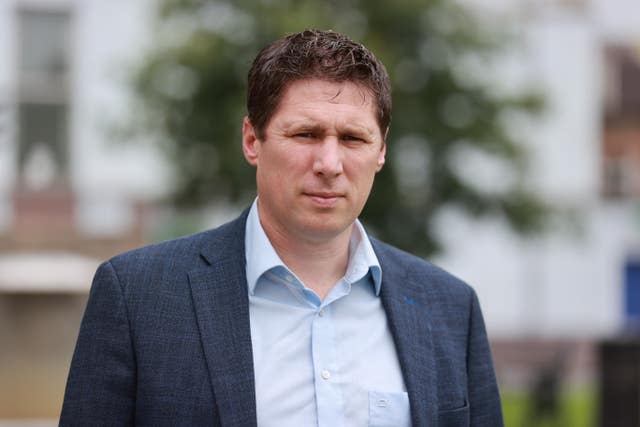
The exit poll’s examination of voter’s second preferences put Fianna Fail and Fine Gael at 20% each, with Sinn Fein at 17%.
The inconclusive results mean that all eyes will now turn to the potential search for coalition partners.
Elsewhere, the exit poll showed: Social Democrats (5.8%), Labour (5%), Greens (4%), Aontu (3.6%), People Before Profit-Solidarity (3.1%), and Independent Ireland (2.2%). Independents and other candidates were on 14.6%.
There is a margin of error of 1.4%.
Matt Carthy, Sinn Fein’s director of elections, hailed his party’s performance as a significant turnaround from the party’s disappointing showing in June’s local and European elections.
“When you consider where we would have been coming out of the local and European elections, I have to say it’s a phenomenal result,” Mr Carthy told RTE.
He added: “We do recall that in 2020 the exit poll actually undershot Sinn Fein to the tune of 2%-plus. So if that was to transpire tomorrow morning, there is every chance that Sinn Fein will emerge from these elections as the largest political party.”
Mr Carthy would not be drawn on what the exit poll might mean for coalition formation.
Fianna Fail deputy leader Jack Chambers said there is a “three-way race” to see who will become the largest party.
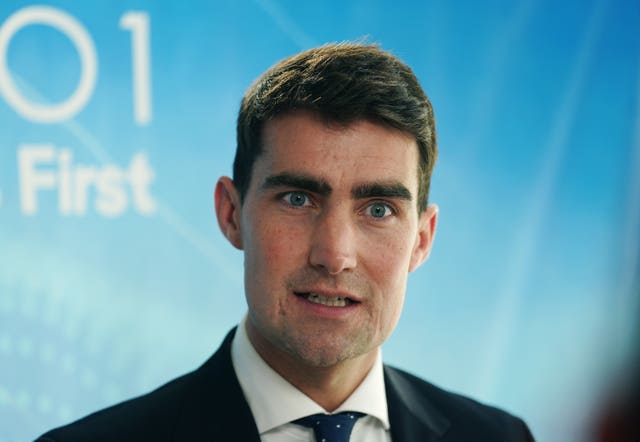
He said the results suggested “further fragmentation” in Irish politics.
Mr Chambers told RTE News: “We’re clearly in the mix with the other two parties.”
On the same broadcast, Fine Gael representative Damien English said the result was a “very solid performance” and predicted the party will return 37-38 seats.
Eighteen of the party’s 35 incumbents are not contesting the General Election, with incumbency historically considered an important factor in Irish politics.
Mr English told RTE News: “So it’s a very positive, solid result. I’m still hoping we might go a little bit more than 21% – I expect we might.”
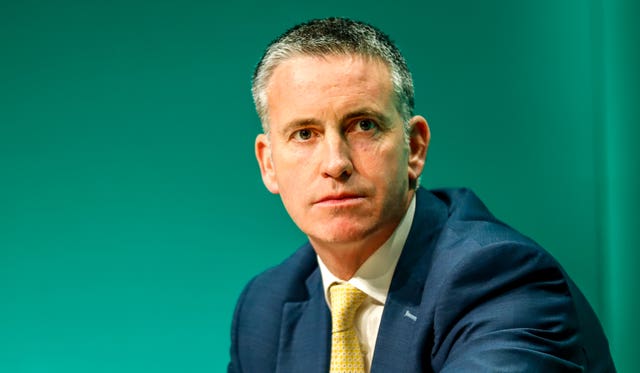
The leaders of Fianna Fail and Fine Gael have consistently ruled out entering into a future coalition with Sinn Fein, citing substantial differences on policy.
Mr Chambers said “nothing has changed” in regard to Fianna Fail’s position of ruling out a coalition with Sinn Fein.
Mr English said it was too early for government formation talks but noted that Sinn Fein’s figures are “well down” from highs of more than 30% seen previously.
As such, Sinn Fein faces a much more challenging route to forming a government.
However, long-held and seemingly insurmountable political differences have eroded as recently as 2020 when the general election also delivered an inconclusive result.
It was in that instance that Fine Gael and Fianna Fail, two parties forged from opposing sides of Ireland’s Civil War of the 1920s, agreed to set aside almost a century of animosity and share power for the outgoing coalition – after similar pledges against forming coalitions had been made prior to the final results.
The Greens joined the coalition as a junior partner.
In that election, Sinn Fein won the popular vote but a failure to run enough candidates meant it did not secure sufficient seats in the Dail to give it a realistic chance of forming a government.
This time around, party leader Mary Lou McDonald fielded many more candidates in a vow not to repeat past mistakes, as she urged voters to elect a government of change without Fine Gael or Fianna Fail.
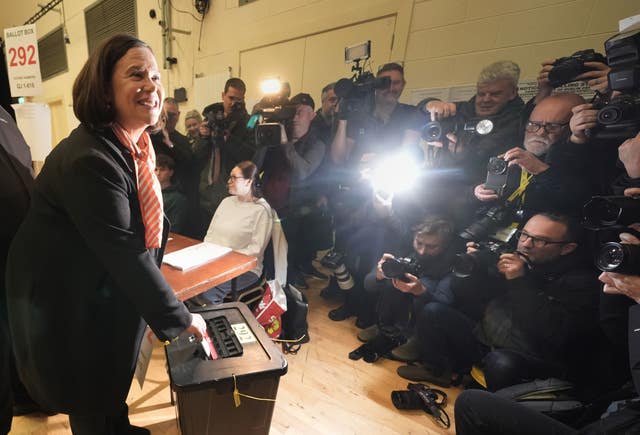
More than 3.6 million people were registered to vote in the election to pick their representatives across 43 constituencies, in a campaign that has focused on the country’s housing crisis, the response to a dramatic increase in immigration, and economic management for the cost of living as well as potential future trade shocks.
The closing of polls ends a lacklustre three-week campaign that seemed to fail to ignite a surge of enthusiasm among the public, after the election was officially called by Mr Harris on November 8.
That decision was ultimately his prerogative, and occurred while Fine Gael was enjoying a lift in the polls after he took over as leader from Leo Varadkar earlier this year.
It also came at a time when Sinn Fein was beset by a string of controversies in the preceding weeks – including former party members writing job references for a colleague who was later convicted of child sex crimes.
But the exit poll suggested that the parties’ fortunes may have shifted.
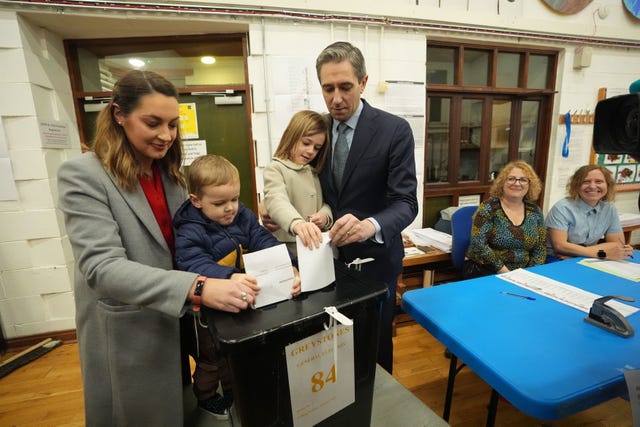
As such, the scale of Sinn Fein’s spending proposals have been dubbed as irresponsible by Fianna Fail and Fine Gael, who have argued that Ireland needs to prepare for potential trade shocks with more prudent financial management.
But the campaigning tactic has been derided as “project fear” and “desperate scaremongering” by critics.
At the same time, a Sinn Fein pledge to instigate an independent review into Irish national broadcaster RTE’s coverage of Gaza and other international conflicts was met with criticism by the party’s opponents, and the National Union of Journalists.
Meanwhile, Fine Gael’s campaign has been plagued with several controversies which the Taoiseach has been unable to shake.
These include a much-criticised encounter in which Mr Harris was accused of dismissing the concerns of a disability care worker at a supermarket, a video of another party candidate involved in a fight outside a pub, and an endorsement of a Fine Gael minister by Ryanair boss Michael O’Leary – that suggested teachers should not run the country.
The party of Mr Martin – a former teacher – also faced criticism over its proposals to decriminalise cannabis for personal use.
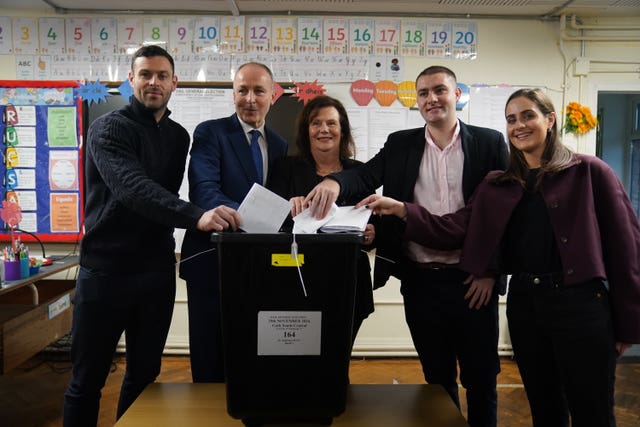
Some party figures were accused of sexism over their criticism of Justice Minister Helen McEntee, Fine Gael’s deputy leader.
After the 2020 election, Fine Gael and Fianna Fail relied on the Green Party as a junior partner to secure the coalition’s majority.
Mr O’Gorman said it looks likely his government partners will be returned to power, but cautioned they could seek an “easier life” over the next five years.
He said this could result in “right-wing independents” or “small populist parties” padding out the numbers.
The final results will immediately kick-start government formation speculation – amid the suggestion of the exit poll that more than three parties will be needed to get over the line.
The protracted process of counting ballots by hand will begin on Saturday.
As Ireland uses a system of proportional representation where candidates are ranked by preference, the voting slips need to be counted several times – an undertaking which can last days.





